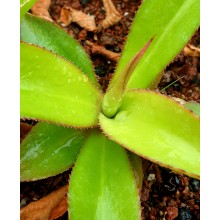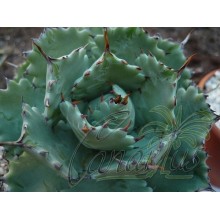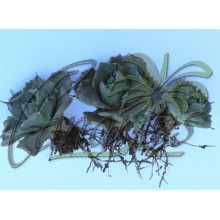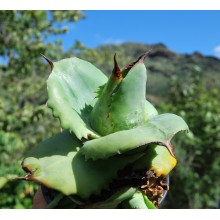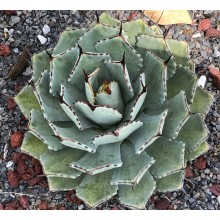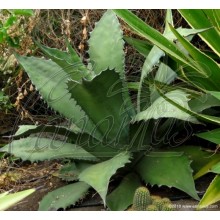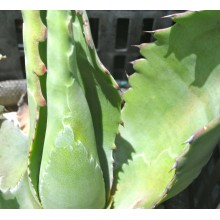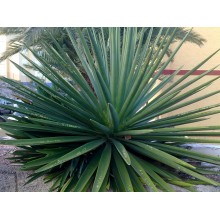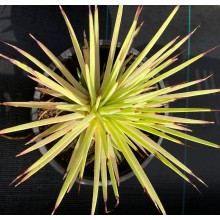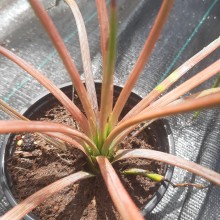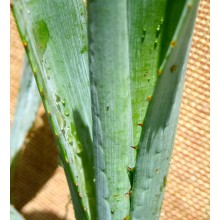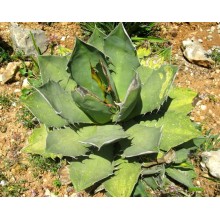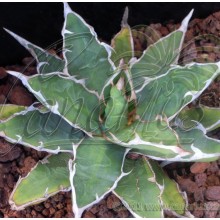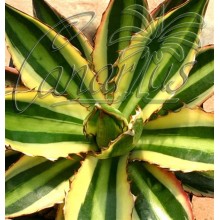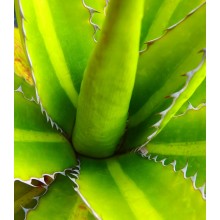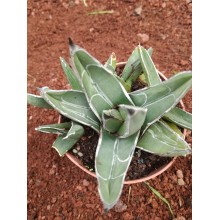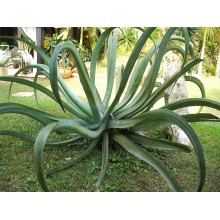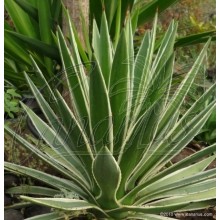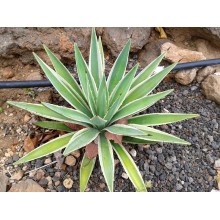General Plants There are 1882 products.

If you like exotic plants, you just came to the right place. Canarius offers the hard-to-find exotic plants which are seldom available in garden centres. Our shop has natural species as well as rare hybrids. We offer exotic plants from the Canary Islands.
Orders are sent to anywhere in Europe and also worldwide. Parcels will reach your home in a few days after shipping (but we also need some days for processing). Feel free to contact us if you have any questions.
Subcategories
-
Succulents
World deserts and dry areas are home to the most interesting plants. Canarius offers an increasing selection of succulent plants of maximum quality, because they are grown outdoors, under the full sun of the Canary Islands.
Succulents or "fat plants" are water-retaining species, adapted to dry conditions. They store succum (juice, water) in their leaves, stems or roots, and often show a stout and fleshy appearance.
-
Exotics
Exotic plants are species from other parts of the world, and they usually have ornamental qualities: a lush foliage, colorful flowers, unusual shapes... Here you can find a great variety of exotic plants: from Bromeliads and Heliconias, to pamls and houseplants.
Exotic plants do not have a particular use. Collectors buy this kind of plants for their rarity, for indoor or outdoor decoration, depending on their features.
-
Fruit, Herbs & Medicinals
Fruit, Herbs & Medicinal plants are focused on getting a better health. In this section, each type of plant produce healthy effects, both fruit trees (Feijoa, Pineapple, Fina de Jete...) and plants for health, such as Graviola, Aloe vera, Callisia fragrans...
In the normal metabolism of all living beings, the organism produces some substances from nutrients latent in the environment; some of these chemicals are part of the process in all (or almost) sort of species. Normally, the useful compounds are concentrated in some of its parts: leaves, seeds, flowers...
Find out your advisable plant and buy it online!
-
Special
On canarius.com we try to remove limits in the field of botany. On our online store we try to facilitate the purchase/sale of plants to anywhere in the world. That's why, we grow from the most common species to the most special plants, as we can see in this section.
-
Agave pendula
Agave pendula
Quite different and attractive, this agave has few leaves and they are fleshy and soft, with a pale green colour, reminiscent of Agave attenuata.
24,30 € -
Agave potatorum
Agave potatorum
14-18 cm pot, bare rooted - Small to medium sized, compact Agave with embossed glaucous leaves. Margins are undulate and armed with reddish-brown spines. It is a mountain species from southern Mexico, found at 1300 to 2300 m (4500 to 7500 ft.).
11,30 € -
Agave potatorum 'Shoji Rajin'
Agave potatorum 'Shoji Rajin'
Agave of 5-7 cm (2-3 in). Dwarf Japanese selection of Agave potatorum. It is very compact and grows only to 5-10 cm (2-4") in diameter. Leaves are wide, thick and dusty blue, with few spines.
12,00 € -
Agave potatorum 'Short Form'
Agave potatorum 'Short Form'
Small sized, compact Agave with short rounded leaves. This selection is especially attractive with a lovely leaf shape. It is easy to grow and hardy, just as the more widespread forms of Agave potatorum, with the typical glaucous leaves with maroon-black spines.
24,50 € -
Agave potatorum ‘Kichiokan’
Agave potatorum ‘Kichiokan’
14-18 cm pot, bare rooted - Small to medium sized, compact Agave with embossed glaucous leaves. Margins are undulate and armed with reddish-brown spines. It is a mountain species from southern Mexico, found at 1300 to 2300 m (4500 to 7500 ft.).
23,40 € -
Agave salmiana var. ferox
Agave salmiana var. ferox
10 cm cutting. A giant in the genus, the ferocious classic Agave ferox can take some frost and snow.
11,70 € -
Agave scabra
Agave scabra
Our plant is the Agave asperrima described by Jacobi, commonly found in the Chihuahuan Desert. It grows beautiful grey-white, average sized rosettes.
11,80 € -
Agave sisalana
Agave sisalana
NEW - 14-18 cm. This is a millenary crop plant grown for fibres named sisal. It originated in Mexico, Chiapas, and is widelycultivated elsewhere. It is probably a sterile cultivar derived from A. vivipara.
11,80 € -
Agave stricta 'nana'
Agave stricta 'nana'
This small agave has become very popular during the past years because of a lot of reasons. It is an official beauty, spineless except at the tip, with green-blue leaves.
20,80 € -
Agave Tenuifolia
Agave Tenuifolia
Agave tenuifolia features slender tufts of flexible, arching, blue-green foliage. Lax rosettes form loose clumps.
14,70 € -
Agave tequilana
Agave tequilana
The famous tekila drink is produced with this species with grey-blue leaves. Agave tequilana is only known in cultivation, and was never found in the wild, but it was possibly originally native to Jalisco in Mexico. It is a large plant with straight grey-blue leaves. It is hardy to light frost, to about - 3 C.
12,30 € -
Agave triangularis
Agave triangularis
NEW !- Olive-green leaves, finely asperous, with a broad paler band running down the center. Native to an arid calcareous region in Teuhuacan, Puebla, at 1650-1950 m elevation. Slow growing, attaining 50-80 cm in diameter. It will stay smaller in pots.
17,20 € -
Agave univittata 'Quadricolor'
Agave univittata 'Quadricolor'
20-22 cm diameter. Exciting garden selection of a small, frost-hardy agave. Rosettes are compact, tidy and four-coloured (quadri-color). This variegated cultivar will survive - 5 C (23 F) and even less if kept dry.
15,80 € -
Agave univittata 'Quadricolor'- LARGE
Agave univittata 'Quadricolor'- LARGE
25 cm diameter. Exciting garden selection of a small, frost-hardy agave. Rosettes are compact, tidy and four-coloured (quadri-color). This variegated cultivar will survive - 5 C (23 F) and even less if kept dry.
39,20 € -
Agave univittata 'Splendida'
Agave univittata 'Splendida'
This small, frost-hardy agave is a non-hybrid clone selected in cultivation, with enhanced colours. Leaves are darker, with a paler central stripe, all is glossy and the leaf margins are almost white. It is frost resistant to -15 C or more if kept dry!
27,50 € -
Agave victoriae-reginae 'Ferdinandi-regis'
Agave victoriae-reginae 'Ferdinandi-regis'
Until recently, Agave ferdinandi-regis was considered a fully different species. It is a very elegant Agave, less compact than victoriae-reginae with dark reddish brown edges (not silvery). It is solitary or very slow to sucker, globose, slow growing up to 45 cm.
17,20 € -
Agave vilmoriniana
Agave vilmoriniana
A totally different spineless Agave unlike any other, with a smooth spreading rosette of elegantly curving leaves. Its unmistakeable "octopus shape" is a highlight both in a succulent collection and in the exotic garden.
26,40 € -
Agave vivipara 'marginata'
Agave vivipara 'marginata'
13-17 cm. This is a popular species, commonly seen in Mexican and Caribbean gardens. Fantastic shape with olive-green leaves with white margins and black spines.
11,40 €
At the moment there are few products in this category General Plants




















